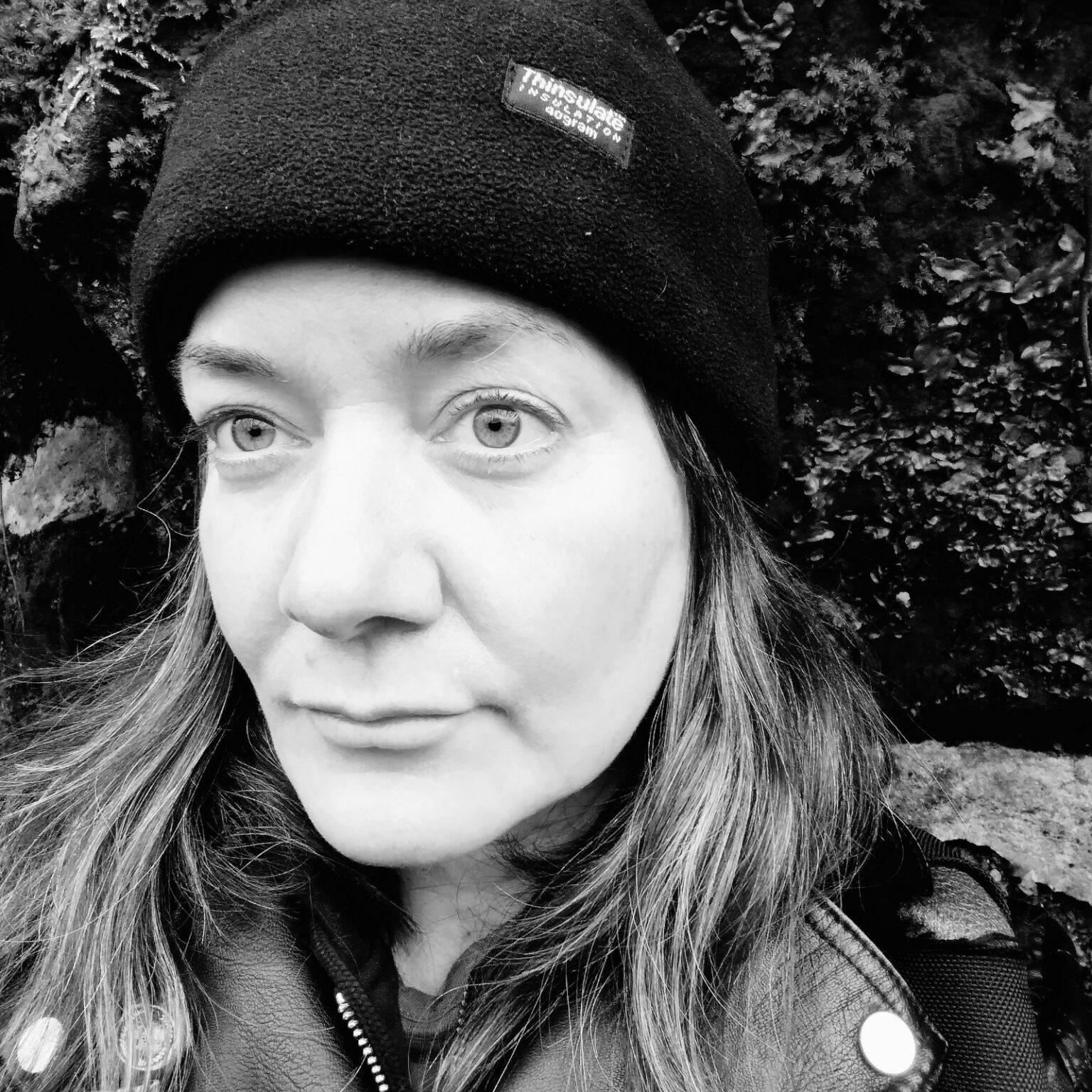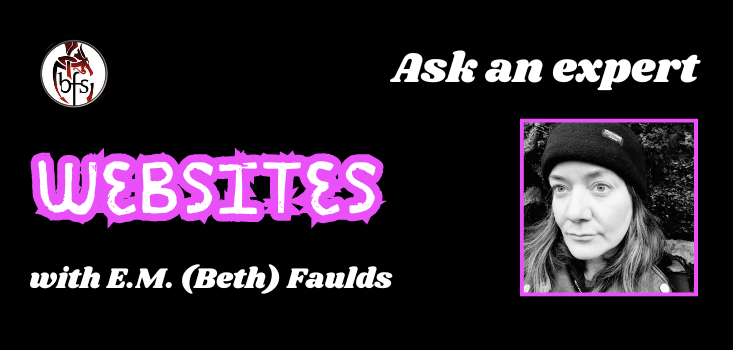In this monthly column, we pose your questions to an expert in a specific field of speculative fiction and the wider ‘industry’. This month, website designer E.M. Faulds answers questions about websites for creatives, as asked by BFS members in our dedicated Discord channel.
This month: Websites, with E.M. Faulds

Name: E.M. (Beth) Faulds
Website: bibliotta.com
Specialism: E.M. Faulds is both a SFF writer and a website designer. She runs Bibliotta, providing webinars and website design for writers.
Follow: BlueSky @bibliotta.bsky.social or @bethkesh.bsky.social
Beth writes science fiction and fantasy under the name E.M. Faulds. Her short stories have been featured on PodCastle, Strange Horizons, ParSec, and Shoreline of Infinity magazines. She co-edited “Gallus”, the Glasgow SF Writers’ Circle anthology, and her “Under the Moon” won best collection at the British Fantasy Awards 2023. In her day job, she is a web designer with nearly a quarter of a century’s worth of experience, and she builds and runs websites for clients large and small. Her webinar project, Bibliotta.com, offers online tutoring for writers looking to learn more about how to build their own websites.
What should you put on a website if you don’t have a book out yet?
There are tons of good potential answers here. The idea is for people to get an idea of who you are and what you’d be like to read, or even work with. As with all web design, it’s whatever suits you best and what you can comfortably keep on top of in your life. But here are a few starters:
- Snippets from your work in progress*
- What you’ve enjoyed reading / watching / listening to lately—people love a shelfie!
- Hobbies—sprinkle in some non-writing interests for a bit of variety here and there
- The latest publishing info or news you’ve come across
- Opinions and politics, though perhaps with some restraint
- An authorial headshot (even if you’re not one yet) or perhaps a representative avatar if you’re shy, your pets, your favourite cactus, a beautiful landscape from your part of the world…**
- What you hope to achieve in terms of publishing, and your journey towards it.
* Top tip – if you publish something on your website, it counts as published! So, don’t put a full work on there that you would like to submit somewhere else (although some might take it as a “reprint”, for a lower price per word.) Keep snippets short and exciting.
** Always keep personally identifiable info like exact addresses, children’s school names, etc, off a website. A lot of creeps out there.
How frequently should new content be added?
There’s no hard and fast rule, but make sure your website looks “lived in”. If the last update was from four years ago, the site visitor might get the impression you’re not interested anymore and pass on by. In addition, web bots that come to index your site like to know the site isn’t abandoned either, so fresh content is good for keeping your site listed in search engines like Google.
How soon before having a book should an author make a website?
As soon as possible! It’s a great idea to start out early. By the time your book is out, your website will be well established and you’ll have plenty of practice using it.
What are some rookie mistakes we should try to avoid?
1) Not having a way to contact you on your site!
I recommend having a contact form with some basic spam prevention methods on it. If you don’t have the ability to get one of these and need to include an email address, format it like myname “at” gmail “dot” com as that will help you cut down the spammers.
2) Buyers’ regret!
Impulsively spending on things you don’t need can put a hole in your bank balance before you’re even started. Purchasing hosting, loads of domain names, and splashy graphics add up. And what if you’ve chosen wrongly?
There are quite a few free or budget options out there. Look for website systems that can start lean and be upgraded if and when you require more.
3) Making it hard to find the good stuff.
Keep what you want people to focus on in your homepage, or easy to find on a really simple menu. The maze of submenus to find what your books are even called is … not a great choice.
Top dos and don’ts for websites, please!
See the tips above as well, plus:
1) Compress your images.
Seriously, a file that is over about 500kb starts to slow down page load and people will leave before it finishes. There are plenty of helpful file compressing apps and so on to keep those sizes down. Always check for permission and licensing to make sure you are allowed to use an image or other content before uploading.
2) Help everyone enjoy your site.
Check out the accessibility tips that abound online. The official ones are quite intimidating but there are plenty of bitesize tutorials out there. Here’s an introduction to accessibility concepts: https://www.w3.org/WAI/videos/standards-and-benefits/
3) Find your niche in the ecosystem
It’s good practice to see what your peers (or writers you hope will someday be your peers) are doing, and make your own mind up for where you fit into that space. Keep in mind look and feel as well as content. There are no rules, but there are some reasonable expectations.
4) Update often!
Not just your content, but also your security, plugins, version updates etc. And back up everything to a thumb drive once in a while for your own peace of mind. I go further into these strategies in my “Your Writer Website part 2” webinars.
Do we really need a blog?
The term “blog” can mean different things to different people. Some people use it to mean an entire content management system like WordPress (see below for more on that). But if you mean the system that works by publishing separate posts on a specific date (a bit like a journal)—then not really.
Some people use blog posts to add thoughts and opinions or write long essays that respond to the latest news and zeitgeist. But you don’t need to do that. You can choose to just have simple, static web pages that contain your content.
But it can be useful for adding timely updates, such as book launch dates, attendance at conventions, latest offers, and so on. It can also help to make your site look “lived in” when people (or search engines) visit it. You can use links to it from social media as a way of extending limited character counts. It doesn’t need to be anything deep and meaningful. It’s just a neat way to use a date-related function so you don’t have to keep overwriting a web page for each new thing you have. If you don’t have much need for it, you don’t need to use it at all.
Totally up to you!
What are some content management systems worth using in 2025?
CMS means “Content Management System”. They are ways of running the site so you don’t have to hand code every page yourself, so, quite useful! (Caveat, I haven’t tried all of these, so you should research and make sure you test a trial before committing to paying for things.) I take a look at these options in my “Your Writer Website part 1” webinars!
- WordPress
- Ghost.org is a new-ish blog / newsletter combination system.
- Wix and Squarespace are well-known basic web builders.
- Joomla and Drupal are open source.
- There are plenty of free “one-pager” website systems.
What is the biggest mistake you see new web designers unintentionally making, and what do you suggest to fix it?
See above for rookie mistakes, but here’s a new one just for you:
Not enough content.
For those who have multiple ‘lives’ online (work persona, perhaps multiple pen names, etc), do you recommend having a single website or one per ‘entity’?
It depends on how much crossover there is and if you would be comfortable mixing the streams of visitors. For example, a very good use case for having work and writing mixed is if your work is in a related field, such as “Fantasy figurine sculptor” or “editor for hire”.
Some people like to keep their work very far away from their author persona. Teachers, civil servants, and other people who have Very Serious day jobs obviously would like to keep that part of their life separate, and under a pen name.
However, the interesting angle is for a writer who has multiple pen names for different genres. Should they have a single site for all? Again, it depends. If it’s public knowledge that you are the two different writers, and you feel that the readers would not be put off by each other, and are of the same general age grouping etc, then I think that’s fine. You can make it clear which name goes with which books, and benefit from having a single place to update and more content in the one site, which makes it attractive for those search engines again.
I cover all of the above topics in great depth on my (irregular) webinars on bibliotta.com. It’d also be a great help to find out when people would like webinars to happen and what they’re interested to learn in them. Please take a second to let me know here: Bibliotta.com Availability and Interests Poll. The data just goes to help me, a single human person, make a small business project useful to more people. Thanks in advance!
Read previous columns
Ask an expert
- July 2025: Anthologies, with Dan Coxon
- June 2025: Self-publishing, with AK Faulkner
- May 2025: Indie presses, with Black Shuck Books’ Steve J Shaw
- April 2025: Being a traditionally-published author with Adrian Tchaikovsky
- March 2025: SFFH artwork with Jenni Coutts
Ask an agent, with Laura Bennett:

